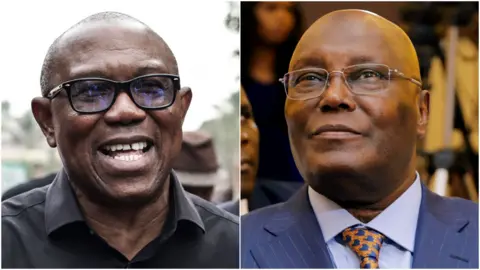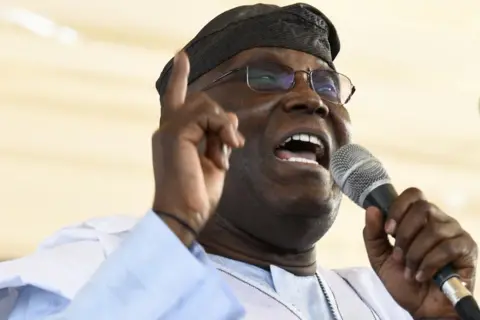Big shake-up in Nigerian politics as heavyweights join forces
 AFP via Getty/Reuters
AFP via Getty/ReutersNigeria's two main opposition leaders have joined a new political party to challenge President BolaTinubu and his ruling party in the next election.
Atiku Abubakar and Peter Obi have chosen the African Democratic Congress (ADC) as their new political home after breaking away from their respective parties - the Peoples Democratic Party (PDP) and the Labour Party (LP).
This is one of the biggest shake-ups in Nigerian politics since the end of military rule in 1999.
Some political heavyweights from Tinubu's All Progressives Congress (APC) party have also thrown their weight behind the formation.
Why have they joined forces?
The announcement is the culmination of a series of talks between the leaders to put up a united front in the 2027 election, rather than splitting their vote.
Tinubu won the 2023 election with just 37% of the vote after opposition supporters were divided between Abubakar who got 29%, and Obi with 25%.
Obi had broken away from the PDP after the party chose Abubakar as its presidential candidate.
At their unveiling with the ADC, interim chairman David Mark said it was an attempt to save the country’s democracy and to stop Nigeria from becoming a one-party state.
Both the PDP and LP are also battling internal crises which some believe were instigated by external forces.
Analyst Shehu Iliyasu said Abubakar and Obi are learning the lessons of the last election.
"Both Atiku [Abubakar] and Obi felt they came so close in 2023 and would have maybe won on a joint ticket so they want to amend their mistake by working together this time around," he told the BBC.
Who else is in the ADC?
 Getty Images
Getty ImagesTinubu's biggest challengers in the last elections, Atiku Abubakar and Peter Obi are the face of the coalition.
Although there’s a long way to go before candidates are officially announced, political commentators are predicting that 78-year-old Abubakar will have another shot at the presidency - it would be his fifth attempt - with former Anambra governor Obi, 63, as his vice-presidential pick.
Other political heavyweights in the coalition include former Senate President David Mark, who like Atiku is leaving the PDP, along with its former chairman Uche Secondus, and former Tinubu ally turned foe Nasir El-Rufai and powerful minister in the last dispensation Rotimi Amaechi.
Is the ADC a new party?
No. The politicians are joining an already existing party which has an acronym closer to the All Democratic Alliance (ADA) they wanted to register.
The party was originally named Alliance for Democratic Change when it was formed in 2005, but it was renamed the African Democratic Congress by the time the party was registered with the Nigerian Independent National Electoral Commission (Inec).
The ADC's Jamilu Danladi said they were sceptical of getting ADA ready in time and that is why they instead went for the ADC.
Registering a new political party is a difficult process. The Inec chairman recently announced that it had received over 100 applications from associations and groups that have submitted letters of intent to become political parties.
Many of those won't make it, as apart from other conditions, the group must have a presence in at least 24 out of Nigeria's 36 states and have a headquarters in Abuja.
The ADC's Dumebi Kachikwu came fifth in the last presidential election and it currently has two members of parliament in the lower chamber.
Despite not being one of the big parties in Nigeria, the ADC has a good national spread and an active political machinery in each state, which will no doubt be boosted with the money and support of the political heavyweights who have joined it.
Its first presidential candidate in 2007 Professor Pat Utomi was instrumental in it getting national acceptance as he's a renowned economist.
Can Obi and Abubakar work together again?
This is the question on the lips of many, as Obi's large support base do not want to see him play second fiddle to anyone else - and this is why he quit the PDP to join the Labour Party in the last election.
While Abubakar's supporters feel with him being the only former vice-president seeking the presidency, every other politician naturally comes second.
When both politicians worked together in 2019 with Obi serving as Abubakar's running mate, they lost to the APC's Muhammadu Buhari.
When Obi left the PDP for LP in 2022, it was a peaceful separation without rancour.
The former governor said at the time that he was moving to LP because it aligned with his aspirations.
As if both knew fate would bring them back together, neither spoke ill of the other either before or during the 2023 campaign.
It will be interesting to see how things pan out between now and 2027.
What are their chances in 2027?
Analyst Ben Kenneth say he believes the coalition has a better chance of defeating Tinubu than last time.
"If you look at what Atiku and Obi got in the last election, it's clear to see that they would've won assuming they worked together, so it’s a good thing they have realised they need each other,” he told the BBC.
However, another analyst Sani Hamisu feels 73-year-old Tinubu has a better chance now than in 2023.
"In Nigeria and Africa, when a leader is in office seeking a second term, he hardly loses, it is very rare and that's why I feel Tinubu has a better chance now than when he wasn't in office in 2019," he said.
Is Tinubu going to run again?
The ruling APC has already endorsed the current president, whose tenure expires on 29 May 2027, to seek a second term.
However, questions over his health will linger as he'll be 75 by the next election and 79 if he were to be elected and finish his second term.
Some media reports say his recent trips abroad were for medical reasons but the presidency has denied that, saying the president is healthy and in good shape.
The APC says it is not bothered by his rivals joining the ADC which it does not see as a real threat.
Acting chairman Ali Bukar Dalori told BBC Hausa the coalition would have no impact on the APC.
"Nobody is talking about a coalition except in Abuja. Even in Abuja, they are in a hotel, and when they are defeated in elections, they will leave the country," he said.
What does this mean for the PDP and Labour Party?
The country's biggest opposition party, the PDP had ruled out joining the ADC, preferring to face the APC on its own.
The Labour Party also called on its supporters to remain focused and resolute behind the party, denying any plans to join a coalition.
For the LP, losing Peter Obi who single-handedly raised its profile to new heights will be a huge blow, and some say it's unlikely to recover in the near future.
The other biggest loser to the coalition is the PDP which has lost several big names.
Analyst Iliyasu Hadi believes the PDP is set to lose its status as the country's biggest opposition party to the ADC.
"When you look at the calibre of politicians in the ADC and those remaining in the PDP, it's clear to see that the ADC will soon become Nigeria's main opposition party, [it's] just a matter of time," he said.
For the moment, neither party seems to have any other candidate of the calibre of either Abubakar or Obi.
However, they do control 11 states, which gives them a strong base, as long as those governors don't defect to either the APC or the ADC.
More BBC stories on Nigeria:
 Getty Images/BBC
Getty Images/BBCGo to BBCAfrica.com for more news from the African continent.
Follow us on Twitter @BBCAfrica, on Facebook at BBC Africa or on Instagram at bbcafrica
